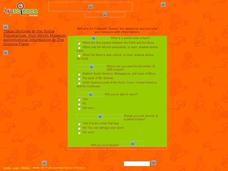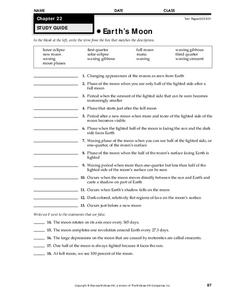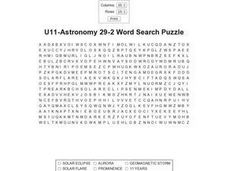Curated OER
Sky Watchers: Ancient Astronomers
Students close their eyes and picture the sky. They are asked to brainstorm things they may see in the course of a night and day, such as the movement of the sun, moon, and stars. Students work in groups to coduct their research. They...
Curated OER
Astronomy Merit Badge
Young scholars explore astronomy through the Starry Night Constellation Adventure software. They print star charts and identify constellations. They sketch the Big Dipper and describe the Milky Way. They list the five most visible...
Curated OER
Spinning into Space
Students, through hands-on activities, teacher demonstrations, pictures, and informational books, complete a unit on the Earth and its place in the Universe. They make mobiles of the Milky Way and watch demonstrations of lunar and solar...
Curated OER
Why Do We Have Night?
Learners engage in a fun, creative way to discover how the Earth moves. This lesson helps students explain why there is day and night. It can also create curiosity to further study the solar system and eclipses!
Curated OER
Wax On, Wane Off
Young scholars explore the Earth's only natural sattelite, the moon. They view a demonstration using tennis balls of the waxing crescent moon, waxing gibbous moon and a lunar eclipse.
Curated OER
Tides, Eclipses, Day and Night, and Seasons
For this earth science worksheet, students use the clues given at the bottom of the sheet to complete the crossword puzzle on tides, eclipses, day and night, and the seasons of the year. There are 17 clues to solve in the puzzle.
Curated OER
Eclipses
In this eclipses worksheet, students read about solar and lunar eclipses to complete 8 short answer questions comparing the two types of eclipses.
Curated OER
Solar and Lunar Eclipses
Young scholars examine eclipses. In this eclipse lesson, students investigate solar and lunar eclipses. Young scholars complete a WebQuest and write a descriptive summary of eclipses. Lesson references a WebQuest, but does not include a...
Curated OER
Curious? Will You Be Eclipsed?
In this "Curious? Will you be eclipsed?" worksheet, 4th graders answer 4 questions interactively about eclipses, then check answers online.
Curated OER
Moon Shadows
For this moon shadows worksheet, 3rd graders follow the directions to set up a demonstration about the sun, the earth and the moon.
Curated OER
Speed of Light
In this speed of light worksheet, students read about Danish Astronomer ole Roemer and his discovery of the speed of light. Students complete 4 short answer questions based on the reading.
Curated OER
Our Solar System
In this solar system worksheet, students read about the planets, asteroids, meteoroids, comets, and the moon. Then students complete 25 multiple choice, 4 true or false, and 3 short answer questions.
Curated OER
Earth's Moon
In this moon worksheet, high schoolers review the different phases of the moon and differences between a lunar and solar eclipse. This worksheet has 13 fill in the blank and 5 true or false questions.
Curated OER
Astronomy
In this astronomy instructional activity, students complete a word search puzzle by finding 53 astronomy terms such as planets, lunar eclipse, and galaxy.
Curated OER
Solar Eclipse Presentation
In this solar eclipse worksheet, students fill in the blanks with terms about the sun and its characteristics and the process of a solar eclipse.
Curated OER
Total Solar Eclipse: August 11, 1999
In this writing prompt worksheet, students learn about the date August 11, 1999 when the last total solar eclipse of the millennium crossed through many countries. Students then use pictures and words to create a diagram that explains...
Curated OER
Comparing Eclipses
In this eclipses worksheet, learners will compare diagrams of a total solar eclipse with a total lunar eclipse. Students will complete 6 short answer questions based on these diagrams.
Curated OER
The Earth-Moon System
In this Earth and moon worksheet, students will review the different phases of the moon, how eclipses are created, and how the moon influences tidal patterns. This worksheet has 13 fill in the blank, 8 true or false, and 2 short answer...
Curated OER
The Sun
For this space science worksheet, students identify and name which gases make up the sun and the name of the part of the sun that we can see from Earth. Then they describe a solar eclipse and draw a diagram illustrating what happens...
Curated OER
Astronomy 29-2 Word Search
In this science worksheet, students locate and identify various vocabulary terms related to space science. There are 9 words/phrases located in the puzzle.
Curated OER
Solar System 2
In this space worksheet, students identify and locate vocabulary terms and names related to the Solar System. There are 31 words located in the puzzle.
Curated OER
Space Search
In this space activity, students identify and locate vocabulary terms and names related to space. There are 26 words located in the puzzle.
Curated OER
Lesson Plan # 1 - Phases of the Moon
Students explore and identify moon phases, watch teacher demonstration of different phases using globe and flashlight to represent moon and sun, and discuss reasons why there are moon phases.
Curated OER
Predicting Lunar Eclipses
Students explore lunar eclipses and discover how to predict an eclipse the same way that ancient people did. They examine dates of recorded eclipses and find a pattern. Students apply an algorithm to the pattern.

























